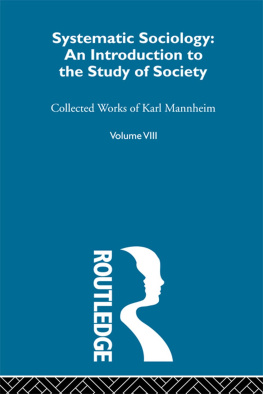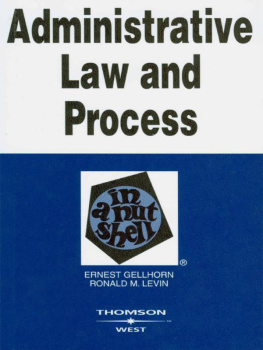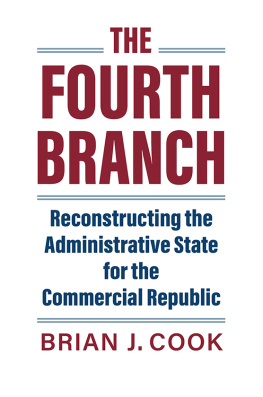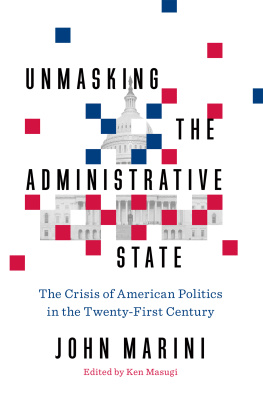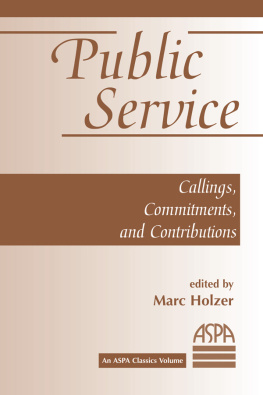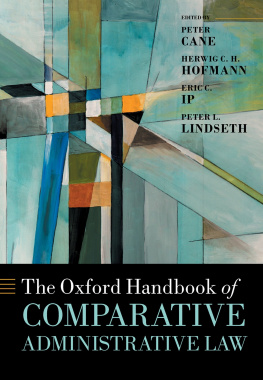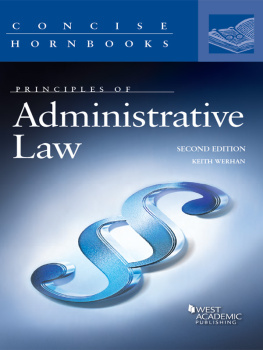INTRODUCTION
T HE three essays contained in this volume were written largely during the last years of Mannheims slay in Germany. They are, in a sense, a sequel to Ideology and Utopia , his principal study in the field of the sociology of knowledge, for the three essays, too, are concerned with the social derivation of meaning. The present volume, however, constitutes not only an extension and elaboration of the principal thesis of Ideology and Utopia , but also a new departure.
I am inclined to regard Ideology and Utopia as an attempt to translate a disillusionment with the excessive claims of German idealism into a sociological theory of thought. Mannheims critique aimed at two aspects of German idealism: the over-estimation of the role of ideas in human affairs and the consequent tendency to assume that concepts which emerge in various periods of history inherently evolve from one another in something like a logical continuum. Mannheims sociology of knowledge sought to outline a method for the study of ideas as functions of social involvements. Once the image of an autonomous evolution of ideas was abandoned it was feasible to explore the relationship between thought and its social milieu.
It is easy to exaggerate the scope of this endeavour, and equally easy to oversimplify its aim. Some critics have felt, for example, that the sociology of knowledge lays claim to a canon of truth and assumes the authority of an umpire between partisans, an authority which sociologists engaged in other areas do not possess. Others have feared that the effort is designed to question the cognitive functions of socially conditioned thinking: for if the sociologist seeks to construe ideas as responses to particular situations he assumes the role of a specialist in the business of deflating all claims to knowledge. Still other writers have found the intrusion of sociologists into the realm of ideation a disconcerting expression of indifference to basic values and truths.
Students of the social sciences and the humanities in English-speaking countries have not generally shared this alarm over the implications of Ideology and Utopia . The drift of its argument is more germane to the trend of English and American historiography and literary criticism, a large part of which shows an intuitive sense for social realities. The spectre of relativism as a scientific tooldisclaimed by Mannheim but actually implied in his criticial treatment of varied subjectsholds little terror for generations brought up on Durkheims collective representations, functional anthropology, Sumners relativity of the mores, Jamess and Deweys pragmatism, W. I. Thomass situational method, and Korzybskis semantics. Quite the contrary, part of the dissent voiced in the United States has been directed at certain vestiges of intellectualism which the reader may be able to detect in some of Mannheims writings, including the present volume.
What are the basic categories of the sociology of knowledge?
Concepts represent interpretative responses to given situations. We are actually dealing with four variables: (i) the situation, such as a community, a nation, a revolution, or a class, which we attempt to interpret when we respond to it; (2) the individual who is peculiarly involved in the situation and accordingly forms his image of it. Such involvements may include occupational aims, political aspirations, kinship tics, economic rivalries and alliances, in short, a multitude of overlapping group attachments; (3) the imagery which individuals or groups adopt; (4) finally, the audience to which the image is conveyed, including its peculiar understandings, symbols to which it attaches meaning, and a vocabulary to which it responds.
The four factors of ideation must be considered as interdependent variables. The same object is differently conceptualized in different situations. Persons involved in the same situation in different ways will other different accounts of it and will tend to alter the situation accordingly. Finally, the individual conceives a subject in accordance with the audience which he actually addresses or tacitly anticipates, and both the form and substance of a message vary with the audience with which the writer or speaker seeks to establish rapport. The sociologist must assume the interdependence of these four factors, for the treatment of any one as an independent variable introduces into the study of ideation an uncritical and unwarranted type of determinism, be it behaviouristic, idealistic, or evolutionary. To assume, for example, that a common economic position necessarily results in an identical conception of society is as unwarranted as the converse supposition that the established currency of certain ideas in itself prescribes the views which individuals or groups adopt of their situation.
Nevertheless, an inquiry may confine itself to the relationship between only two or three of the four variables. This is what Mannheim does in the essay on the intelligentsia, in which he correlates certain types of ideation with the social habitat of their authors. His observations on the social origin of scepticism show how far one can gel with the help of two variables only. In this work Mannheim deliberately avoids making extended use of the third variable, the historical situation, for reasons I shall indicate subsequently. One may assume that he was aware of the fourth factor, the audience, in the formation of concepts. His remarks on the democratic process and such phenomena as formalism and the operational criteria of truth, contained in the last essay, can be taken as an indication of such an awareness.
Once the inquiry is so delimited the objective is to outline typical relationships between thought and social habitat. The particular involvement of an individual in his society opens to him a certain perspective, an area of social experience, which has its scope and its limitations. The scope of social experience is defined by the insights which the person may gain through his participation in the social process; while the limitations of his vista are set by the blockages which he imposes on himself when he assumes a role and is forced accordingly to make characteristic choices. To trace the limits within which individuals interpret their experience is not the same as to refute their interpretation. An image of society which grows out of a wide range of experience is not invariably more valid than a segmental view. Whether a synthetic conception of the whole contains more truth in some sense than does a particular perspective is a question which the sociologist may not decide without overreaching himself. At any rate, the pragmatic test, by which the resulting action proves a proposition, docs not always favour the broad, synthetic view of things.
The present essays show in several regards a notable advance beyond Mannheims earlier treatment of ideation. In his previous publications ideologies appeared as by-products and reflections of social situations. The frequent use of optical expressions was quite significant: ideologies appeared as particular modes of either seeing or obscuring things, and each position in the social structure entailed a particular perspective . To be sure, the use of optical terms for ideologies constituted a gain over the treatment of social bias as mere distortions of truth. But the proposition that each vista corresponds to a certain role does not offer a clue to the nature of the relationship between thinking and social location. Why, one may ask, docs an individual who is identified with several groups adopt the conceptions of one rather than of another?
What Mannheim proposed in Ideology and Utopia was a sociological theory of ideation as an introduction to a systematic attempt to discover typical relationships between ideologies and social situations. One may designate the aim of such a pursuit as the natural history of ideas. The natural history of a social phenomenon outlines its typical features without necessarily explaining why they are recurrent. Mannheims monograph on conservative thinking (Conservative Thought, in Essays on Sociology and Social Psychology , London, Routledge & Kegan Paul; New York, Oxford University Press, 1953) offers a typical illustration. In this study Mannheim described a characteristic relationship between the declining position of landowners and their tendency to perceive the social process in organismic and morphological terms. Attempts of this type can be constructive provided that the established relationships are derived from reliable samples whose scope and representativeness are ascertained. Since, however, historical case studies offer but weak support for generalizations the question of how and why certain roles coincide with particular ideologies becomes inescapable; for without demonstration of the dynamics of concept formation the road toward a progressive verification and elaboration of such hypotheses remains blocked. To accept such blockages is tantamount to admitting that the sociology of knowledge is an area of episodic insights and no field for cumulative inquiry.


